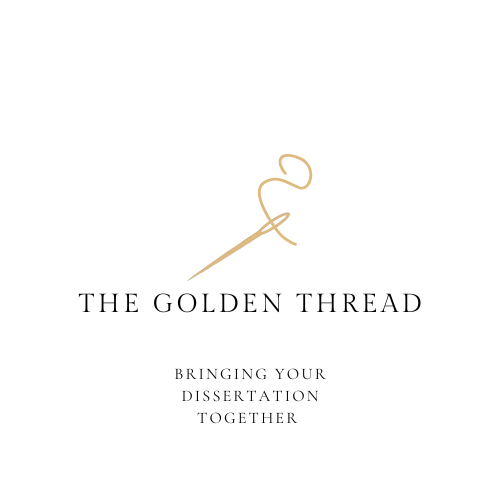If you’ve been following my blog (which, of course, you have—right?), you might have already read my previous post on what the golden thread is. But in case you need a refresher: the golden thread is that clear, consistent line of argument that connects all parts of your dissertation, from introduction to conclusion. It stops your work from resembling a collection of disconnected ramblings and instead makes it a coherent, compelling piece of academic writing.
But understanding what it is and actually weaving it through your dissertation are two very different beasts. If your dissertation currently feels more like a tangled ball of wool than a neatly threaded masterpiece, don’t panic. Let’s talk about how to keep your golden thread running strong.

1. Start with a Clear Research Question (Your Thread’s Origin Story)
Before you start writing, you need a research question that is clear, focused, and (most importantly) actually researchable. If your question is too broad (e.g., “What is happiness?”), your dissertation will veer off in every direction. If it’s too narrow (e.g., “What was the happiness level of one pigeon in Hyde Park on 3rd April 2023?”), you’ll struggle to write more than two pages. Find that sweet spot and let your research question guide your structure.
2. Your Literature Review: Not Just Name-Dropping Scholars
Your literature review should serve your argument, not just list what other academics have said. Too often, students treat this section like an obligatory name-dropping contest (“According to Smith (2020)… Meanwhile, Jones (2019) disagrees…”). Instead, use it to build towards your research question—showing gaps in knowledge, contrasting viewpoints, and setting up your study as the natural next step. The golden thread should be evident in how you position the existing research to justify your study.
3. Methods: Why You Did What You Did
Your methodology should align with your research question like a well-fitted suit. If you’re investigating people’s perceptions of a new policy, qualitative interviews make sense; if you’re measuring economic trends, you probably don’t want to rely on interpretative dance (unless that’s your field, in which case—fascinating!).
Avoid the classic mistake of throwing in a fancy method because it sounds impressive. Instead, ensure your method logically follows from your research question and theoretical framework—keeping that golden thread intact.
4. Results: Present, Don’t Ramble
When you reach the results section, resist the urge to tell the reader everything you found. Instead, highlight the data that directly answers your research question. If a particular statistic or interview quote doesn’t help move your argument forward, it’s just background noise. Keep it relevant, keep it focused, and most importantly—keep it golden.
5. Discussion: Bring It All Together
Here’s where things often go awry. The discussion should not introduce brand-new ideas that you wish you’d researched but didn’t. Instead, it should bring together your findings, compare them to existing literature, and answer your research question. If your golden thread has been well-maintained, this section will feel like a satisfying “aha!” moment rather than a desperate scramble to make sense of things.
6. Conclusion: Stick the Landing
Your conclusion should not be the moment you suddenly discover new, groundbreaking theories. Nor should it be a rushed afterthought. Instead, it should neatly summarize what you set out to do, what you found, and why it matters. If your golden thread has been consistently woven through your dissertation, your conclusion will feel inevitable—in a good way, not in a predictable Hollywood movie way.
7. Editing: The Golden Thread Audit
Once you’ve written your draft, go back and do a golden thread check. Ask yourself:
- Does every section clearly link back to my research question?
- Do my arguments build logically on one another?
- Have I gone off on any unrelated tangents that need trimming?
This is where working with an academic coach (like yours truly) can be invaluable. Sometimes, you’re too close to your own work to see the loose threads. A fresh set of eyes can help you tighten your arguments and make sure your dissertation flows seamlessly.
Final Thoughts
Weaving the golden thread through your dissertation is about consistency, clarity, and connection. If you keep your research question at the centre of everything you write, structure your argument logically, and ensure each section serves a purpose, your dissertation will feel like a cohesive, polished piece of work—not a chaotic jumble of ideas.
And if you’re struggling to untangle your own thread? I’m here to help. Book a free introductory call through my website, and let’s make sure your dissertation has a clear, strong golden thread running all the way through!
Happy writing (and happy threading)!